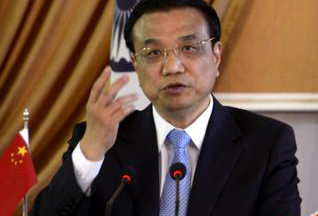 New Delhi, May 21: Chinese Premier Li Keqiang on Tuesday said India and China have the “wisdom” to find mutually acceptable solution to the boundary problem and the two countries have not shied away from addressing the vexed issue.
New Delhi, May 21: Chinese Premier Li Keqiang on Tuesday said India and China have the “wisdom” to find mutually acceptable solution to the boundary problem and the two countries have not shied away from addressing the vexed issue.Mr. Li also said China will support its enterprises to increase investments in India and help Indian products have access to Chinese market as he supported a favourable trade balance in a bid to decrease mounting bilateral trade deficit.
A day after two rounds of talks with Prime Minister Manmohan Singh, Mr. Li said China has the intention to “sincerely” resolving the pending issues, including that of cross-border rivers, and favoured increased bilateral relations between the two big neighbours.
Supporting a favourable trade balance and seeking to decrease trade deficit between India and China, he said Beijing will support Chinese enterprises to increase investments in India and help Indian products have access to Chinese market.
Addressing the Indian industry at a function organised by FICCI in Delhi, the Chinese Premier said cooperation between the two big neighbours will lead to a “new paradigm” of cooperation.
“India and China have not shied away from addressing boundary question, have wisdom to find a fair and mutually acceptable solution...We have been able to put all issues on the table,” he said.
He also quoted a Chinese proverb — a distant relative may not be useful as a near neighbour — to emphasise on the relations between the two neighbours.
Invoking ancient relations between the two, he said, “We will be able to take the bilateral relations to new heights. We have launched a new agenda...taking India-China relations to a new starting point for further growth,” he said.
“We are one-third of world’s total population and our interactions attract the world. Without doubt, China-India relations are most important global relations,” he said.
Stressing on the need for increased people-to-people interaction between India and China, Mr. Li declared 2014 as the year of exchanges between the two nations “so as to boost our understanding and friendship”.
Mr. Li favoured peace and stability in the South-East Asia region and hoped the “relevant issues” will be resolved soon.
“We have also discussed issues of regional security. We hope there is peace and stability in South Asia and a stable South-East Asia is consistent with China’s interests,” he said.
On India-China trade relations, Mr. Li said it is imperative for the two countries to maintain a “dynamic trade balance”.
“India and China are huge markets with huge potentials...we will support Chinese enterprises to increase investments in India and help Indian products have access to Chinese market,” he said.
While striving to realise the trade turnover target of USD 100 billion by 2015, the two countries agreed to take measures to address the issue of trade imbalance. These include cooperation on pharmaceutical supervision, including registration, stronger links between Chinese enterprises and Indian IT industry, the joint statement said.
Mr. Li said peaceful co-existence between India and China will be of global significance and they should seek cooperation from not afar but closely.
The cooperation between the two countries will induct a “new dynamism” in its relations, he said.
Noting that China is still a developing country, he said, “I want the voice of developing countries to be stronger. China and India are linked to each other through natural boundaries. Our friendly relations date back to ancient time.”





Comments
Add new comment